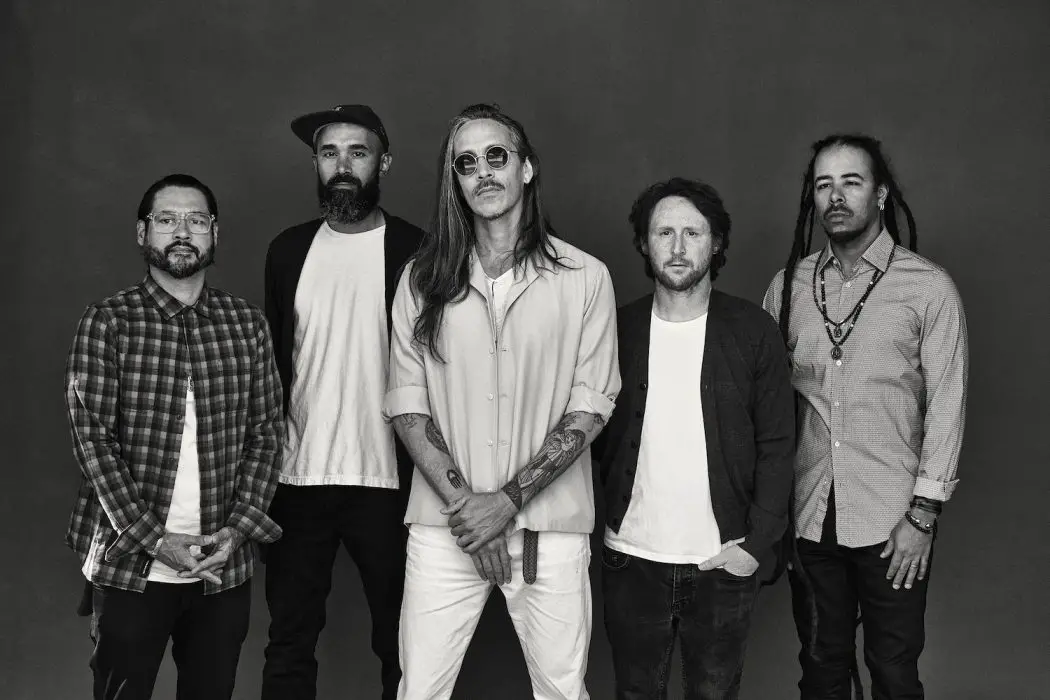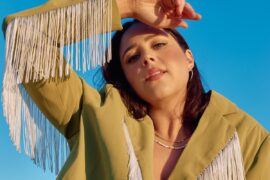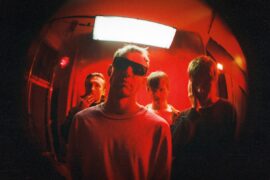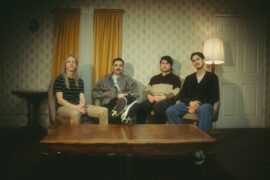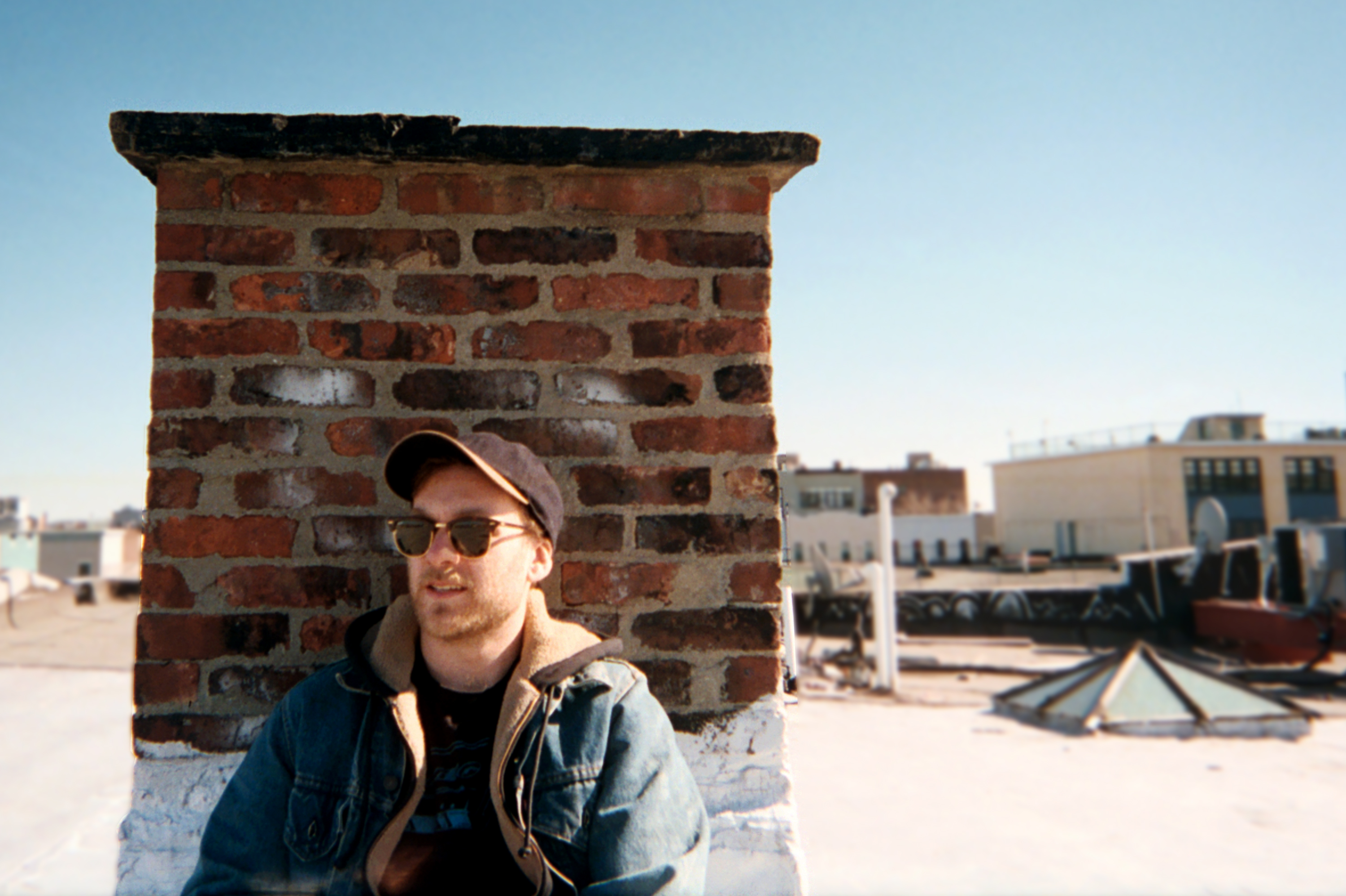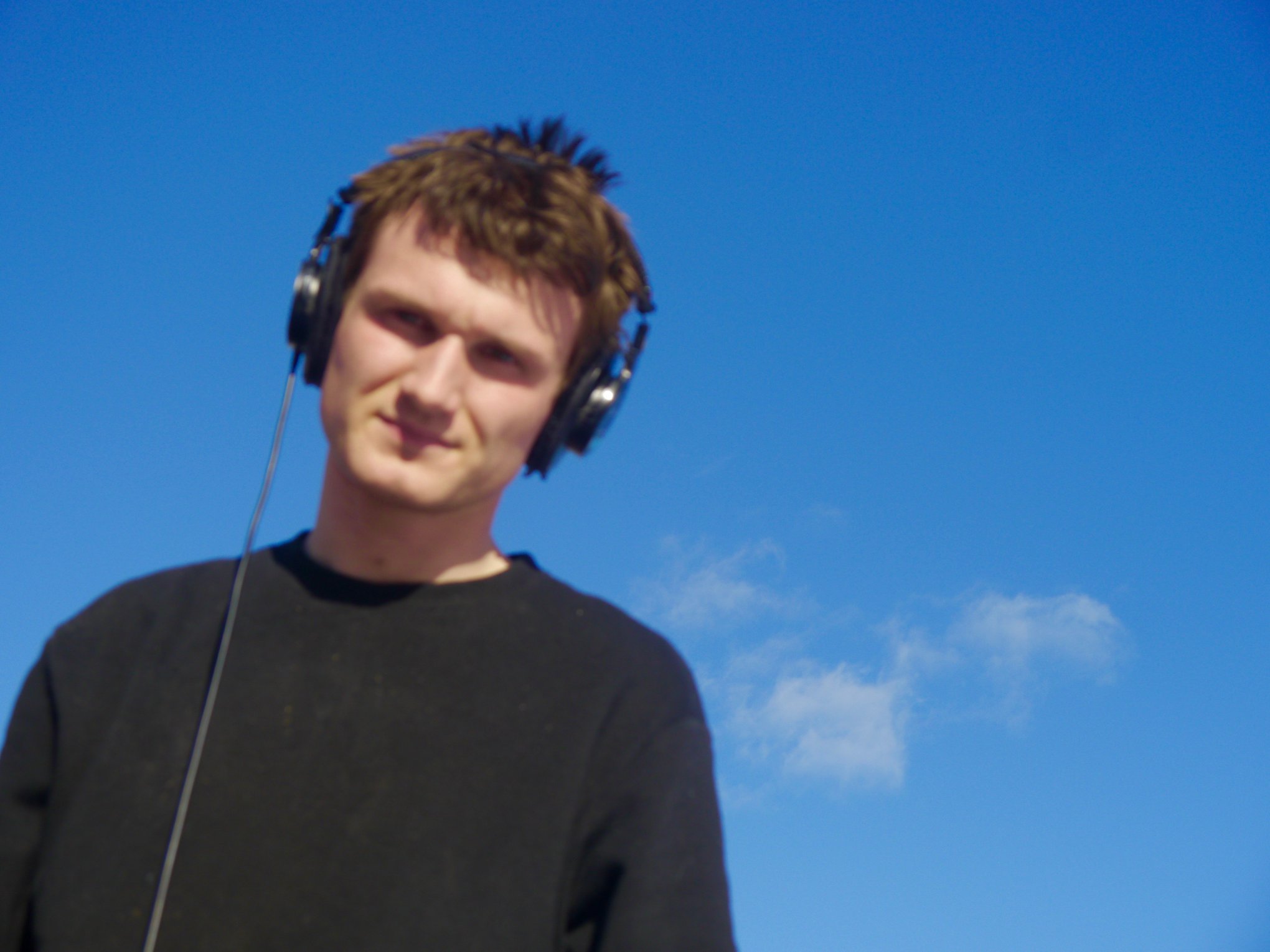Incubus frontman Brandon Boyd discusses the band’s exciting 30-year career and the inspiration & energy behind their new EP ‘Trust Fall (Side B)’ – a rollicking, spirited record that kicks in all the right ways.
Stream: ‘Trust Fall (Side B)’ – Incubus
Whatever tomorrow brings, Incubus will be there. Active for three decades, the band whose music dominated the early aughts continue to be mainstays of the alternative musiverse today. Freshly independent and still coming down from 2019’s massive Make Yourself 20th Anniversary World Tour, Incubus have returned in force – starting the new decade strong with their very own studio space and a rollicking new record that kicks in all the right ways.
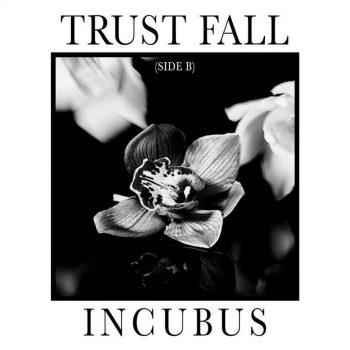
Released on April 17, the five-track Trust Fall (Side B) takes listeners on a refreshing twenty-minute journey through connection, presence, and vulnerability. Bridging emotion and experience, Incubus’ songs tap into life’s highs and lows with spirited energy: Revitalized and renewed, 2020 marks a new era for Incubus as they embark on their fourth decade together, doing what they do best.
Formed in 1991 in Calabasas, California, Incubus rose to prominence in the late ’90s as a part of the alternative and nu metal scene. They found mainstream success with 1999’s third studio album Make Yourself, a double platinum record that spawned such hits as “Pardon Me,” “Stellar,” and “Drive” – the latter of which remains the band’s highest charting song to date.
The intervening years have spawned many more studio albums, EPs, hits, and tours alike, with Incubus constantly reinventing themselves along the way.
From metal and rock to electronic, funk, jazz, hip-hop, grunge, and beyond, the band don’t necessarily adapt to top trends of the moment, so much as they follow their own compass – and in doing so, they have remained unrelenting trailblazers throughout an impressive decades-spanning career.
Incubus’ longtime lineup consists of Brandon Boyd, Mike Einziger, José Pasillas, Chris Kilmore, and Ben Kenney. Frontman Boyd attests his band’s longevity to a combination of dedication, mutual respect, and camaraderie: “If we understand anything collectively, it’s that any successes or any sort of goal that any one of us stumbles onto is going to inform the larger process of our band Incubus together,” he tells Atwood Magazine, “so we kind of hold each other up in moments where each of us has individual successes, and that’s definitely helped us in our longevity as well.”
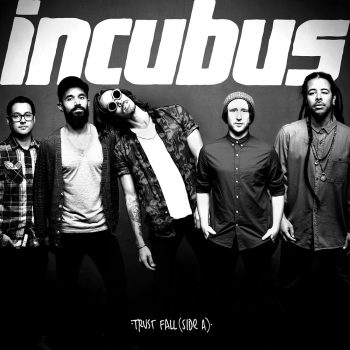
Trust Fall (Side B) arrives as the companion record to Trust Fall (Side A), a four-track EP released back in 2015. “I was kind of leaning into this moment, I suppose, intellectually and/or spiritually, where I knew that if I was going to continue to move in the direction that I wanted to creatively, I was going to have to turn around and kind of fall back into the sort of metaphoric arms of a process that is much bigger than me,” Boyd says of that first record’s inspiration.
The two Trust Fall EPs are both thematically and sonically linked, whether or not Incubus meant for that to happen. “It wasn’t necessarily intentional,” Boyd says. “We have intentionality to what we do, but it’s hard to pin down. Those intentions actually kind of reveal themselves long after the fact. So we’re doing what we’re doing, and it’s very much flying by the seat of our pants – very much hands out in front of us in a low-lit room, looking for a light switch. Occasionally we find it and it’s like, holy shit, this sounds amazing! And sometimes it’s like, Yeah, no. We’re just kind of doing our best to find that light switch.”
“The good news there is that as a band, I think that if we ever got good at anything, it was flying by the seat of our pants,” Boyd remarks.
Released in the midst of the COVID-19 global pandemic, Trust Fall (Side B) resonates with thrilling passion and fervor.
It’s a fiery bout of passion and intense alternative rock that feels surprisingly present and of-the-moment. Incubus sound rejuvenated on songs like the eerily timely “Karma, Come Back” and the sincere love song “Our Love.” The band evoke sounds of the past on their sunny and nostalgic “In the Summer,” and they capture a beautiful closure with the EP’s solemn closer, “Paper Cuts.” Most of all, Incubus are in their element on the stunning “On Without Me,” a heavy-hitting anthem that’s already hit home with the band’s community.
Incubus have undoubtedly tapped into a new pool of creativity on Trust Fall (Side B): Their love and steadfast commitment to their craft have paid off in full on this new EP, a must-listen for longtime Incubus fans and newcomers alike.
Sure, they’re flying by the seat of their pants – and they’re doing it in style.
Atwood Magazine spoke with Incubus frontman Brandon Boyd about the band’s formidable thirty-year career, their inspirations, and the refreshing energy behind the band’s new EP Trust Fall (Side B). Catch up with Incubus exclusively on Atwood Magazine!
— —
Watch: “Our Love” – Incubus
A CONVERSATION WITH INCUBUS
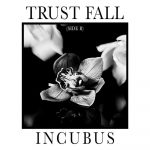
Atwood Magazine:Thank you so much for your time today, Brandon – I really appreciate it, and congrats upon this EP release! Where are you right now, and how are you and the band doing?
Brandon Boyd: My pleasure, thank you too! I’m at home in Los Angeles. Everyone’s doing well, you know, considering the circumstances. Obviously none of us have ever seen anything like this or experienced anything like before, so we are all flying by the seat of our pants, I suppose.
The good news there is that as a band, I think that if we ever got good at anything, it was flying by the seat of our pants. We’re a pretty adaptable bunch of guys, and we’re pretty adaptable units. It is occurring to us that, you know, the main way that we have gotten music to people throughout out career is by showing up and inviting as many people as possible into confined spaces where everybody gets real sweaty and rubs up against each other, so it’s occurred to us that we’re going to have to continue to adapt to the current circumstance in order to continue to push forward. So we’re doing our very best. We’re really stoked to have new music out though; I think that it’s a great time for people to be able to use music in whatever capacity that speaks to them, whether it’s a form of escape or whether it’s a way to introspect and turn inwards.
Yeah, it affects everyone differently. I know some artists who’ve spent the past few weeks at home literally creating their next albums. Do you find the creative juices are flowing for you during this time?
Boyd: Very much so. It’s not as simple as I’m stuck at home, I’m going to write a record. There are parts of that for me that are definitely at play. But I think that what I’ve been experiencing – and before I even say what I’m about to say, I’m just going to preface that by saying that I feel incredibly blessed to be able to stay home in a situation like this; there a lot of people out there, and I know some of them, who don’t have the option to stay at home, or some of their jobs are considered essential jobs. And a lot of these people are happy to go to work so they can keep their income flowing. But first of all, I’m eternally grateful to the people I know that are doing that, but then everyone else out there in our world that’s doing the same.
But yeah, I feel very blessed to be able to stay home. And so my experience thus far has been one kind of like cocooning. I’ve been I’ve been reading a lot; I don’t have cable TV, and I don’t follow major sort of media sources. So I get my information from different areas, and I’ve been reading a lot; I learned how to cook much better – I’ve been intending to do that for a long time! I’ve been playing a lot of guitar, I’ve been learning a lot of songs, I’ve been painting a lot, bonding with my family and some friends in ways that I never had the opportunity to. So there are definitely some “upsides” to this experience.
It's the silver lining, obviously. We have the humility to recognize that everybody doesn't get to go through this in that way. When our healthcare workers tell us the best thing we can do is to stay home, we’ve got to do our part, too.
Boyd: Yeah.
I was wondering if we could take a minute to look to talk about Incubus’ impressive career. Your band has now been active for three decades: How do you keep inspiration and energy flowing for such a long time?
Boyd: That’s a really good question. I don’t know if I have a definitive answer for you, but I am aware of certain things that we have been doing this entire time, and some of those things are that we have allowed for moments of really intense focus – whether it’s on songwriting or touring or performing live – and we’ve gone into periods of time where sometimes a tour will last for 18 months, and we completely dedicate ourselves to it.
And then something else that we do when we’ve finished with those kinds of cycles, is we give each other space to kind of let the thing go to sleep for periods of time. Then we kind of allow it to naturally wake back up, as opposed to resuscitating it with life-support mechanisms of some kind. We’ve had periods of time in the band where we struggled both creatively and interpersonally. And we’ve even had a period of time where we thought we wouldn’t survive another month, and our answer to that was to talk things out and communicate to the best of our ability, and then give this thing some space – like let it breathe – and in doing that, we allowed for a kind of natural rhythm to take place, I think.
So that’s definitely one of the things I think that has lent itself to our longevity. I also think that each of us is individually very creatively curious. And each of us in our own ways are creatively curious. So everybody when left to their own devices absolutely has individual creative pursuits, and each of us kind of encourages those things in each other. So I think that maybe if we understand anything collectively, it’s that any successes or any sort of goal that any one of us stumbles onto is going to inform the larger process of our band Incubus together, so we kind of hold each other up in moments where each of us has individual successes, and that’s definitely helped us in our longevity as well.
How would you describe this latest iteration of Incubus with the songs off Trust Fall (Side B)?
Boyd: This has been an interesting process for us, because, you know, it’s definitely not the first or the second or the third or the fourth or the fifth or the sixth or the seventh or the eighth! We’ve been doing it, like you said, for close to 30 years now, and each time is a little bit different: It’s a little bit different in the way we approach it. There are definitely consistencies and through lines, with the way that we do things, but one thing that was different this time around, was that we finally – after talking about it for like, 15 years – we finally actually got our own rehearsal, writing, and recording studio: A place of our own.
Some of the guys call it Cobra Kai; I call it the band room. I like to keep things kind of humble, but it’s sort of lovingly referred to as Cobra Kai, where there’s no mercy – because it’s deep in the San Fernando Valley, so it definitely invokes Karate Kid vibes.
So we go in there, and we’ve been able to fine-tune everything to our individual needs and desires. It’s relatively close to everybody, and we go in there and we write, and we rehearse, and we fuck around, and we laugh, and we commiserate and we smash our heads together and we’ve been making things! It’s something we should have done fifteen years ago; we just have been too busy on tour and coming off tour, and getting ready to go on tour, and all these things, you know? We finally bit the bullet and got the space, and it was kind of one of the best things we ever did. In saying all that, I think we created an environment that was kind of calling in a new kind of creativity for us, and this EP is really the first glimpse of what that is. There will be a lot more music!
Not only do you have a studio space, but Incubus are also independent now. Those two things combined, they do make for a new era of sorts. Does it feel like it's a new era for you at all, aside from it being 2020?
Boyd: Yeah, it definitely does. We did the more traditional route with record labels for 20-something years, and to much success! Like the old school record label paradigm was very good to us for the most part; we definitely had our run-ins with the darker parts of it, which are kind of unavoidable… But I think that we did our best to ride those dark times out, and we kind of came up smelling like roses, but back when it came back around and it was like, “Hey, it’s time to put out some new music,” for all of us collectively, it was a really easy decision to say we don’t want to be on a major label anymore. I don’t think that that’s necessarily part of the standard karma any longer. So thus far, this new independent approach has been really fantastic and really, really fun and very important.
In the early ‘90s, there wasn't necessarily an option of not really being on a label if you were going to make a full, life-long career out of it. And the fact of the matter is that it’s a whole new world now in 2020, in terms of what you can do and the audience you can reach without that push.
Boyd: We actually started as an independent band in the early ‘90s! The first piece of music we put out was an independent record called Fungus Amongus, and we sold all of 1000 copies – we printed 1000 copies, and we sold 1000 copies!
And that feels like so much!
Boyd: It was a win for us, but let me tell you like selling 1000 copies was hard. When we did get to work with a major label, it was it was definitely exciting and an exciting moment for us, for sure.
Creatively, this EP sounds fresh. There's something about it that just hit me; it's something new, like you tapped into some new pool of creativity here. Have you and the band ever sat down and talked about the songs that you're making right now, and what they mean or how they feel for you?
Boyd: Yeah, I mean, we definitely took our time in making this EP. In fact, we were putting songs out for it before we even finished with it. I think, partly it was because we liked what we were making, but also because we were excited about it. I think everybody in our band knew that we were on to some really interesting and exciting creative streak. And as anybody in any creative field – I’m sure you can even attest to this as well – it’s like, when you really feel that kind of flow, for lack of a better word, it’s exciting and you jump on, and you kind of just hold on and ride it out. It’s really electrifying; it’s a beautiful feeling, and I think it’s one of the reasons why we all do what we do – for the little moments of flow.
People always say the best song is the one you're about to write or the one you just wrote. So you're always trying to improve upon the past, or be the most true to yourself as possible. I think it's exciting that you can keep those things fresh consecutively year after year like that.
“Trust Fall” is an incredibly evocative name; obviously the song “Trust Fall” graced 2015’s Trust Fall (Side A), but what was it exactly that inspired this title for these two EPs?
Boyd: Like you said, it started with the concept around the song. When we wrote it in 2014, I was kind of leaning into this moment, I suppose, intellectually and/or spiritually, where I knew that if I was going to continue to move in the direction that I wanted to creatively, I was going to have to turn around and kind of fall back into the sort of metaphoric arms of a process that is much bigger than me, sitting at my desk with a band and trying to control every aspect of it.
And so this image of a kind of “trust fall” “into the arms of all,” it coincided with a pretty profound psychedelic experience that I had. In that experience, I was given the opportunity to kind of surrender to something, I don’t know what to call it, because I don’t really have the proper vocabulary. And I chose to, and it was one of the most remarkable experiences I’ve ever had in my life. It lasted a night, but it also felt like it lasted for like 10 years, and I was able to shed multiple layers of spiritual and emotional skin that had been kind of like clinging to me. In a matter of speaking, it was like a tree shaking someplace, like all the dead leaves fell off and I felt like I got to start over. So it was inspiring and I wrote a lyric about it, and then that’s when this idea started to move. And so we had the intention of writing this EP that became known as Trust Fall (Side A), and we always had the intention of doing a Side B, but we never put a timeframe on it. In the interim, we wrote 8, put out a full-length record, went on a whole world tour, did the thing, it was super fun… And then when this batch of songs had kind of come to its completion, I chimed back up and I was like, “Guys, this should be Side B,” and I got very little pushback from the guys – they seemed to enjoy the idea of completing the Trust Fall thought. So we did it, and we completed the circle!
When you're making songs, do you think about them in terms of the live performance? Are you writing music with the live performance in mind, or do you let the record speak for itself and let the live performance reflect what's on record?
Boyd: …I don’t, and sometimes that bites me in the ass, because I write what comes, when it comes. We sort of write songs; we perform them to record them. And then we perfect them to tour to the best of our ability. And we mix it, we put it out, and after that, then we actually learn how to play the song!
And sometimes, when I say it bites me in the ass, sometimes, I’ve written a melody that’s damn-near impossible for me to sing – more than one time! That’s one of the things that may have kept me on my toes too, as a singer and a performer, that I don’t enter into the live performance arena with 100% competence. I come in with more of a willingness to fail spectacularly, and that ends up being a lot of fun most of the time!
I love that! That’s interesting. I kept on thinking that Side B really feels like the continuation from Side A, and it almost made me think how 8 feels like a divergence – that it’s more like Side A happened and then Side B happened, and that whole album was its own thing in-between.
Boyd: Yeah, it very much was! It’s interesting that you picked up on that because it wasn’t necessarily intentional. We have intentionality to what we do, but it’s hard to pin down. Those intentions actually kind of reveal themselves long after the fact. So we’re doing what we’re doing, and like we originally started this conversation, it’s very much flying by the seat of our pants – very much hands out in front of us in a low-lit room, looking for a light switch. Occasionally we find it and it’s like, holy shit, this sounds amazing! And sometimes it’s like, Yeah, no. We’re just kind of doing our best to find that light switch, I suppose.
I like it. So let's dive into the songs a little bit: You open the record with “Karma, Come Back,” with this foreboding bass line and your own ominous lyric, “You’re right to be kind of bitter, that serenade, you could say, it was a con.” Why begin the record with this song?
Boyd: For a couple of reasons, I suppose. The most important reason is that, in its kind of sonic aesthetic, it feels like the start of something. We definitely deliberate as far as the sequence of our records is concerned. A couple of the guys don’t care, which is kind of awesome. So it’s really two or three of us that deliberate over every little detail – and I’m one of the guys that wants to deliberate over every little detail, and so I fought for this song to be first, because it feels like it’s starting something in that kind of ominous, creeping feeling. It feels even more… I don’t want to say relevant, because that would be blowing too much smoke up our own ass, but there seems to be some kind of a timeliness of that very first feeling and the first lyric that comes through. I could go on and on about the sort of the intention and the details of the song.
What is it about the timeliness of “Karma, Come Back” that gets to you? Feel free to keep going!
Boyd: Yes, so it’s been both fascinating and heartbreaking to watch the slow moving disaster that has been the american political/cultural experiment over the last few years. But all of it (save for the mind numbing surprises that have greeted us every few weeks) hasn’t been entirely unpredictable or “out of nowhere”. There has been a sense of impending mass accountability that has been creeping in and out of my thoughts for a long time. A feeling like, “when are we going to get the bill for the way we have been operating?” Does that make sense?
So when the early iterations of this track started to emerge and I would close my eyes and attempt to translate what I was seeing, it looked a lot like a female silhouette dancing slowly in a flickering, dying light. I see that sputtering light as the last energetic gasps of our political/cultural/collective paradigm and the dancing form as Karma herself, anthropomorphized and patiently swaying back and forth in a kind of preemptive taunt before she sends all of that energy back at the place where it came from. In the chorus’ I suppose I’m pleading for “I-You-We” to do better, lest we incite the same impartial cosmic wrath upon ourselves in a kind of infinite repeat. All of this is not in some religious, the end is nigh kind of way. More observational, and hopefully embodying more of a mythopoetic sensibility. Can you tell I’ve had two cups of coffee?
“You’ve got to do better before this karma, karma, karma comes back.” These words feel eerily relevant, especially over these past few years as we’ve seen so many in power fail again and again. What makes human betterment an engaging topic for you?
Boyd: I like this question. And as huge as this topic is I think the best way to summarize my thoughts on it are this: Potential! One of the things that makes human beings so remarkable and miraculous is our capacity for imagination and ingenuity. Among other things, of course. So it’s spiritually and intellectually titillating to imagine what human beings can do. The flip side of that is the shadow that is inevitably attached to every action. So we need to keep that in mind as well. As big as our capacity for imagination and ingenuity is, our potential to do terrible things is just as real.
“Our Love” feels especially light, with its airy atmosphere and jovial lyrics, “our love’s not hiding anymore.” It feels like a sweet love song, which helps it stand out in the Incubus catalog. What inspired this tune?
Boyd: This song was an interesting one because it’s born of a guitar riff, that first guitar riff that you hear in the track, Michael wrote that riff probably six years ago. And he sent it to me about six years ago, and it was sent to me in a kind of avalanche of other guitar riffs that he was circulating around the band. I had an immediate visceral reaction to it, and I recorded the actual lyric that you hear on the record – I recorded that in my house about six years ago. And it ended up getting kind of buried amongst a bunch of other ideas and a bunch of other songs we were working on. I’m not joking, we kind of forgot about it.
I was looking through an old file of Incubus emails that got sent back and forth. And I was like, “Our Love,” what’s this? I heard it with fresh ears and I was like, “This is good! We should finish this song.” So we got it in the studio together and we finished it pretty quickly, we wrote the bridge to it, and we mixed it. I’m happy that it kind of stumbled back across my path!
I really dig the funky vibes in “Into the Summer.” This track is really bright, kind of reminding me of the feelings I get when Led Zeppelin’s “Fool in the Rain” comes on – it’s a bright release. How did this song come together?
Boyd: Right, thank you. We once again were in the band room, and Michael started playing that riff, and then Ben immediately joined him with the bass link that you hear. We all agreed pretty quickly that it was feeling like it came from another era. And so we kind of purposefully leaned into that era of Bowie and started recalling some of the other bands of the era that we were all kind of obsessed with as kids. And so we just leaned into it, and let the nostalgia run amok.
I love it. I spent a little too much time reading the comments on your Facebook page – you have a lot of diehard fans who like to review your EPs in the comments section, which is fun. And at first blush “On Without Me” really seems to have hit home with listeners. What do you think it is about this song that resonates? What about it speaks to you?
Boyd: First of all, I am so thrilled to hear that it’s resonating with our longtime listeners; I’m so used to the first reaction to new music that we put out being really borderline violent, like, “How could you do this to us you motherfuckers, I will forever curse your names and my future children!” So actually as a result I kind of stopped reading comments and comment boards a long time ago, so once again, I’m very happy to hear that it’s resonating well.
That song in particular was the last track we recorded for the EP, and it’s probably the track that we put the most collective might into. We started writing it while we were on tour this fall, with the 20 years of Make Yourself run that we did. Every day at soundcheck for a couple of month, we’d chip away at it – so I had a couple of months to really think on the lyric and fine-tune it, and fine-tune the melody, and I’m so thrilled we were able to do it the way that we did, because it’s one of those songs that wanted to be kind of big and airy – a big breath – and I think we shunned that when we started laying into it, so it got to get the space that it needed, to be made.
“You are not meant to read them; those words were mine,” you sing at the end of “Paper Cut.” “These pages, razorblades, secrets I can’t take back.” It feels like a fitting closure; can you speak to the significance of this ending for you? What drove your decision to close with “Paper Cuts”?
Boyd: I’m considering this question and I think the honest answer today is that I don’t really know. Not decisively why, that is. I have some ideas as to why it felt like the right way to close this one out but I may need to sit with it a while longer before giving you a good answer.
For me, this EP coming out in quarantine is both an escape, as well as a warning: It's got that 1-2 punch of both joy and humility built in. Have you had any similar thoughts around the context of this release?
Boyd: It’s such a bittersweet thing to be honest. I am so happy and thankful that we get to put out music at all, then we have that lovely complication of potentially being some people’s escape from what’s happening now as well as some people’s nudge to dive deeper and connect to art that might act as a conduit for shifting out of certain patterns. I just hope, once things smooth out a bit, that this new batch of songs doesn’t remind people of being in quarantine.
Incubus celebrated Make Yourself’s 20th anniversary last year, which means some of your biggest hits are now old enough to buy a beer. Does it mean anything special to you, to see a song like “Drive” aging (and aging well, I might add)?
Boyd: It does, honestly. Yeah, it means the world to me. It’s tough to even try and put into words, to tell you the truth, because we put everything into this band. It’s our baby, you know? And we put as much love and care and attention into it as anything I think any of us have done in our lives… So if even a song is thought of well twenty years after its inception, I think that’s an incredible blessing. I’m thrilled that people still seem to be resonating with something we put out so long ago. Yeah, I’m incredibly, incredibly grateful and thankful.
Whatever tomorrow brings, you’ll be there. Speaking of how “Drive” is now 21 years old, has this song or its story gained any new meanings to you over the years, or do those lyrics still evoke the same images they did when you first wrote them?
Boyd: It’s wild that it’s been that long. I could go on and on about it, but I’ll just say that songs end up being like snapshots of a time and place. You look back on them and sometimes you cringe at your haircut or how low (or high) your pants were. In this case I’m pretty ok with what we were wearing and how little hair gel we employed, so I’m warmed by this snapshot and don’t mind sharing it again.
What other artists are you listening to these days, whom you would recommend to our readers?
Boyd: I’ve been really loving Weyes Blood, Beach House, Emma Ruth Rundle, Trentemoller and a bunch of others. What a time for art, huh?
Can you talk about collaboration as a band during quarantine? Have you found a way to make it work? I know you'll be potentially playing some livestream shows, does that kind of thing feel at all natural?
Boyd: It’s been challenging to kick things into a gear that I’ve grown accustomed to being that most of the way I know how to do what I do in this band is born of being in the room with the guys and vibe-ing with each other. We’ve been playing with ways of sending MP3s around though and playing a kind of telephone game. It is indeed sharpening our skills of adaptability.
Listen, thank you very much Brandon, and again congratulations on this EP release and my best to the band!
Boyd: I appreciate your time too, thank you. Have a great day!
— —
:: stream/purchase Trust Fall (Side B) here ::
Stream: ‘Trust Fall (Side B)’ – Incubus
— — — —

Connect to Incubus on
Facebook, Twitter, Instagram
Discover new music on Atwood Magazine
? © Incubus
:: Stream Incubus ::

